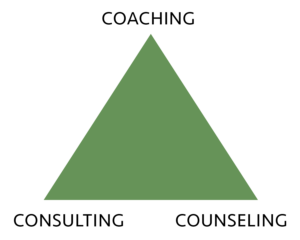What is Coaching?
Coaching is a terrific support in growing as a leader, onboarding successfully to a new role, during a particularly challenging time in an organization’s lifecycle, and for many other reasons. While lots of people are interested in coaching, it’s a tough thing to understand until you’ve actually experienced it.
So what exactly is coaching?
The International Coaching Federation defines coaching as partnering with clients in a thought-provoking and creative process that inspires them to maximize their personal and professional potential.
This is a great definition, but leaves a lot to the imagination. A more practical way to explain what coaching is to compare it to other modalities most of us are more familiar with – consulting, counseling, training, and mentoring.
In consulting, the consultant is the expert. We hire them for knowledge we don’t have, or to help do work we can’t get done on our own. There’s an assumption in the consulting model that the consultant is in the lead and may direct what we should do. We turn this assumption on its head in coaching, where the client is the expert on their life, career, and so on.
The coach’s job is to draw out the inherent wisdom of the client in service to the client’s goals. In coaching, the client is the expert.
People often comment that coaching feels like therapy, but it differs in a couple of key ways. Therapy is often focused on current or past traumas or issues. It starts with the assumption that something is wrong or broken. In coaching we start with the assumption that you are whole, wise, and perfectly situated to lead your own development. From this starting place, we tackle the beliefs that arise from our earlier experiences, and we ask whether those beliefs are now serving you or limiting you. If they’re limiting, what new beliefs might serve you better? Coaching is very future-focused.
Many individuals have participated in leadership development or other programs in a group setting. The primary differences between these programs and coaching is that the programs are 1.) based on having a standard curriculum that is not customized to the individual, and 2.) focused on transferring knowledge to the participant about skills and competencies. While skills and competency development can be an important part of coaching, coaching has the potential to transcend “what you know” to get to “how you think,” which is richer territory to explore the further we get into our careers.
Lastly, mentoring. Many people think mentoring and coaching are the same and are based on giving advice. In fact, there is the key distinction between the two. Mentoring consists of someone sharing their advice and experience based on having “been there, done that.” While you sometimes want a coach who shares a similar background, research shows this is not a predictor of outcomes at least as far as industry is concerned.
Instead, coaching holds you as expert and the coach adds value by creating a safe space for you to work. Coaches do this by partnering with you on your journey, which can include asking powerful questions, listening deeply, offering observations and reflections, and sometimes, just being silent.
One of the reasons I became a coach is because it differs so significantly from the other modalities we use to help people grow and develop. It is unique in its total customization and ability to meet you where you are and to help you move forward in significant ways.
Check out my next blog in this series on demystifying the coaching experience, where we dig even deeper into the magic of coaching and discuss what the work of coaching actually is.

